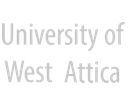Full Issue
| View or download the full issue |
Table of Contents
Research Articles
| Archives and records management in machine learning technologies context: a research hypothesis on university records | 7-13 |
| Ioannis Triantafyllou, Christos Chrysanthopoulos, Yannis Stoyannidis, Anastasios Tsolakidis |
| Everyday photos as tools to enhance the museum experience | 14-27 |
| Angeliki Antoniou, Susana Reboreda Morillo, Eftychia Vraimaki |
| Developing the infrastructure for managing institutional research archives | 28-35 |
| Anastasios Tsolakidis, Evangelia Triperina, Ioannis Triantafyllou, Christos Skourlas |






